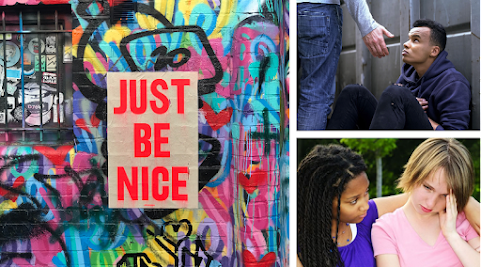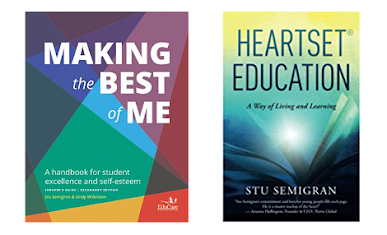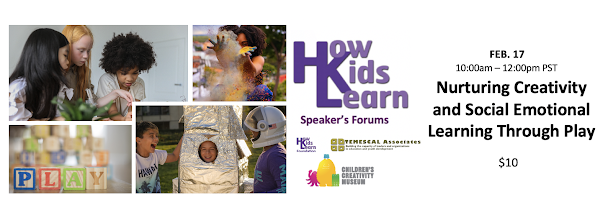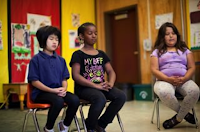By Sam Piha
It seems we live in a time in which meanness is in vogue, whether it's social media, political discourse, cyber bullying, violent actions, or hate crimes. To learn more we interviewed Stu Semigran, Co-Founder and President of the EduCare Foundation. His responses are below.
Q: Do you agree that meanness is in vogue? And why do you think this is so?
A: It certainly appears as if discord, againstness, and striking back is increasingly evident in our world. Many people are feeling threatened and fearful with a great need for power, to gain control, and stake out positions of being “right” and claiming others as “wrong”. Righteous judgment is on the loose. On one level, people are dealing with more stress and are looking to feel more secure. One misdirected approach for establishing a sense of personal security may be to stake out a position, hold on tight and defend it, and then combat anything that might shake that position- threaten that false sense of inner security.
 |
| Source: www.pexels.com |
It takes a strong sense of self (apart from our righteous beliefs) and a solid foundation to withstand and be receptive to other points of view. Building that deeper core of self-awareness and self-acceptance leads to a freedom to step into a world where opposing opinions, beliefs, and points of view are not threatening.
Building greater self-acceptance and self-compassion opens the way to more readily respond to others with more acceptance and kindness. The path out from meanness- to tolerance, to understanding, and to compassion- is each person’s responsibility. Educating towards that is the aim of Heartset® education.
Q: How would you define “Kindness”?
A: Kindness is a generosity of heart. It is expression of loving in action. It has infinite expressions. It may be a mere thought, a wish, or prayer for another. It is a willingness to risk sharing love and compassion and perhaps being rejected or misunderstood. Kindness can be expressed quietly or very demonstratively. It may be seen or go unnoticed. Nonetheless, it is setting a tone, a pervasive foundation of caring and unconditional love.
Kindness provides the encouragement and the fortitude to keep going when life is tough by knowing that you are valued, supported, and cared for.
“Do your little bit of good where you are; it’s those little bits of good put together that overwhelm the world.”- Desmond Tutu
Q: What can we do in afterschool to prevent meanness? What can we do in afterschool to promote kindness?
A: As adults we can promote kindness by taking care of ourselves, expressing kindness with others, encouraging our students to treat themselves kindly, and by teaching kindness activities on a regular basis so it becomes a way of relating. There are many excellent resources for teaching compassion, empathy, and kindness. One, developed through EduCare, is Making the Best of Me: A handbook for student excellence and self-esteem, that includes over 200 easy-to-use, engaging activities for afterschool and school day classes.
Community service projects are terrific opportunities for students to build the lifestyle habit of expressing kindness. Practicing acts of kindness individually and as a group or class are impactful, joyful ways to begin to redirect a pattern of meanness to one of acceptance and compassion. Acts of kindness and community building become important parts of the kindness formula. The mindset and heartset of giving and receiving kindness set a personal habit and lay a solid foundation for students to continue to develop throughout their lives.)
 |
| Source: EduCare, Lynwood, Ca. |
Q: Can you give an example of kindness between youth and their peers or community?
A: One example is the Take Action Campaign (TAC), a far-reaching initiative launched in 2008 by Los Angeles Unified School District’s (LAUSD’s) Beyond the Bell and facilitated by EduCare and several community partners. TAC gives thousands of high school students leadership opportunities by celebrating the arts, serving their schools & their local communities, and empowering them to mentor their peers. Projects have included volunteering at homeless shelters & food banks, environmental cleanups, tree planting, food and clothing drives, unity building events, and student led advocacy campaigns around issues important to them. In school year 2022-23, students from 37 LAUSD high schools are participating in TAC.
Q: You recently wrote a book Heartset Education: A Way of Living and Learning. Can you say a little about the book and whether it would be useful for afterschool leaders?
A: Students need to have their minds ready to learn. However, to become active learners, a lot of our young people need more than that. They don’t just need a new mindset; they need a new heartset. When the heart is set in a good place, the mind is open and receptive. When heart is troubled, the mind is cluttered. So heart and mind have to go hand in hand.
Q: Can you describe what the Educare Foundation does?
A: EduCare Foundation’s mission is “to inspire and support young people in empowering themselves to become responsible citizens, courageous and compassionate leaders, and live their dreams.” In 1987, EduCare piloted the ACE (Achievement and Commitment to Excellence) Program in one Los Angeles Unified School District (LAUSD) middle school. ACE focuses on the social-emotional learning (SEL) elements of character development, personal management, emotional intelligence, and interpersonal skills. EduCare’s flagship ACE Program became the forerunner to the educational movements that today bear many names: Character Education, Social-Emotional Learning (SEL), and Trauma-Informed Teaching. To learn more about EduCare’s efforts, check out their website here.
Q: Why did you start this organization?
A: Why EduCare? It was a chance, an opportunity, a pressing need that I saw to do something that I thought was missing in education- to address an obvious need of my students who were coming into my classroom when I was a middle school teacher in LA. I could see that they were lost in many ways. For many, their wholistic needs, not just physical needs, but their emotional, mental and social needs as well, we're not being addressed and attended to.
I wanted them to be healthier and happier and be in a place to succeed academically. I felt they needed to develop greater self-awareness and personal development tools so they could believe in themselves, ignite their desire, and gain the skills for creating a successful and fulfilling life. I wanted the chance to touch their hearts, open their minds, and hopefully assist them in empowering themselves to transform the trajectory of their lives.
 |
| Michael Funk |
MORE ABOUT…
Stu Semigran is the Co-Founder and President of the EduCare Foundation. With over 35 years of experience as an educator, he has facilitated thousands of youth, professionals, educators and parents in Heartset® education, SEL, leadership development, and afterschool management. His new book, Heartset® Education: A Way of Living and Learning, has been rated a #1 Amazon New Release Bestseller. His previous book, Making the Best of Me: A Handbook for Student Excellence and Self-Esteem, is used in schools worldwide. He was recognized in 2012 as a David Chow Humanitarian Award Foundation recipient for his service to youth.
- Your reactivity profile,
- Closing the stress cycle,
- Regulation techniques for kids and grown-ups,
- Mindfulness for the fidgety,
- Personal wellness plans,
- What to do when the sh*t hits the fan





























